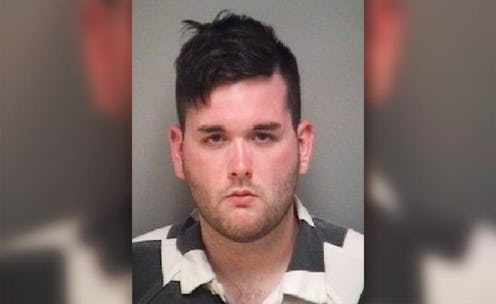News
Why We Need To Stop Pretending White Male Terrorists Are "Lone Wolves"

Almost a year ago today, on August 15, 2016, President Donald J. Trump gave a speech on terrorism, namely, “radical Islamic terror,” and why it’s so important to call it out. After this weekend’s violent white supremacist demonstration in Charlottesville that left one dead and 19 injured, President Trump’s initial statement attributed the violence and bigotry to “many sides,” rather than calling the incident what it really is: radical white terrorism.
President Trump isn’t the only one skirting the issue. Many prominent news outlets have avoided labelling James Alex Fields — the “very bright kid” who wrote a freshman year assignment “along the party lines of the neo-Nazi movement” and killed a woman when he drove a car into a crowd of people on Saturday — as a “white supremacist,” a “radical,” or “a terrorist.” Some headlines refer to Fields as a “suspect,” “the driver,” while others avoid mentioning his name altogether.
Can we expect to see “White Rage” headlines or cover stories? Where are the journalists asking where Fields was radicalized? Do we know what books he was reading or what online communities he was a part of? Why are many refusing to call the violence in Charlottesville an act of terrorism?
The passive coverage of Fields and his horrific act are nothing new. Even though right-wing extremists have committed nearly twice as many acts of terrorism as Islamists, white males are consistently portrayed as lone wolves rather than part of a larger system of white supremacy.
For example, there’s Jeremy Christian, the “man with nebulous political affiliations” who is accused of killing two people who defended Muslims in Oregon. There’s Alexandre Bissonnette, the “lone wolf” charged with killing six worshippers at a Quebec mosque. And there’s Dylan Roof, who killed nine African-Americans at a historic black church in Charleston — a “classic lone wolf.”
The Random House dictionary defines terrorism as “the use of violence and threats to intimidate or coerce, especially for political purposes.” By that definition, the three white men I mentioned and those inflicting violence in Charlottesville could all be considered terrorists. Yet, it seems much of the media reserves “terrorism” for when those with Middle Eastern roots or darker skin are implicated.
While these individuals acted alone, they’re part of a larger movement of White Supremacists that condone these sorts of acts. They’re in online communities, they’re participating in rallies, and they’ve been inspired and motivated by the words and actions of our President.
The tendency to turn these incidents into “lone wolf” scenarios rather than acts inspired by a cohesive community and ideology is highly problematic. While these individuals acted alone, they’re part of a larger movement of white supremacists that condone these sorts of acts. They’re in online communities, they’re participating in rallies, and some have been inspired and motivated by the words and actions of our president, with former KKK leader David Duke even indicating that the Charlottesville protests "fulfill the promises of Donald Trump." The popular white supremacist site Daily Stormer praised President Trump’s statement on Charlottesville: “Trump comments were good... Also refused to answer a question about White Nationalists supporting him. No condemnation at all. When asked to condemn, he just walked out of the room. Really, really good. God bless him.”
It’s time for the media to acknowledge these acts as radical white terrorism – to analyze the Dylan Roof story alongside the Alexandre Bissonette story alongside the Jeremy Christian story, just as the media analyzes acts of Islamist domestic terrorism alongside one another. If we refuse to start conversations on the undercurrent of white supremacy in this country and attribute it to “lone wolves,” we’re choosing to remain ignorant to the fact that radical white terrorism is a major threat to American security. We’re ignoring the fact that a deeply rooted racist culture is enabling these people to commit atrocities. We’re dismissing the experiences and feelings of marginalized communities who have been impacted by it. And we’re failing to understand why these “lone wolf” incidents continue to happen over and over again.
It’s easy to call these white men lone wolves, but one look at the photos from the Charlottesville rally reveals an angry mob. These racists didn’t need to cover their faces with hoods. They’ve spent their whole lives under the presumption of white innocence, knowing that their bigotry won’t carry any major implications for them — the ultimate manifestation of white privilege and white supremacy.
We need to change this false narrative. White men are committing acts of terror, and they’re empowered by America’s long-running legacy of white supremacy and this administration’s refusal to repudiate their cause. A media narrative that feeds into that can only make things worse — it fails to hold people in power to account for their reliance on this base. Let’s strive to understand how these acts are connected to one another. Let’s hold supremacist communities, online and off, accountable. Let’s not downplay these acts for what they are: radical white terrorism, and let’s condemn their hatred, oppression, and violence once and for all.